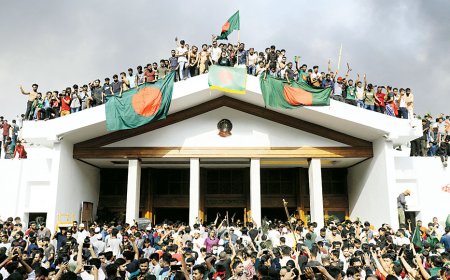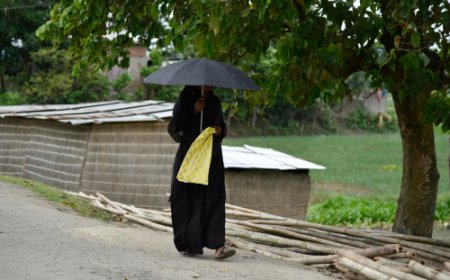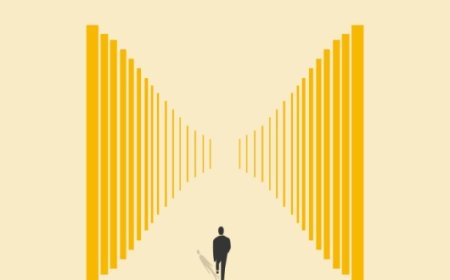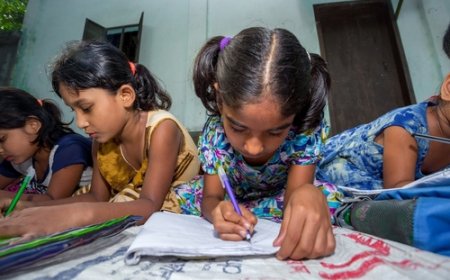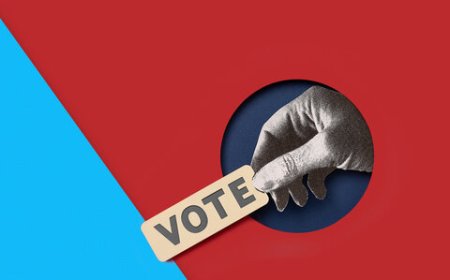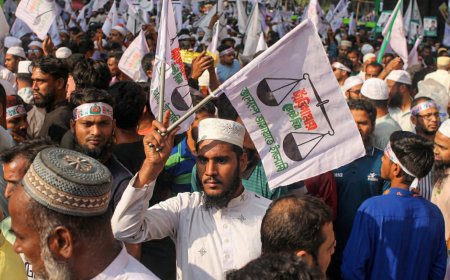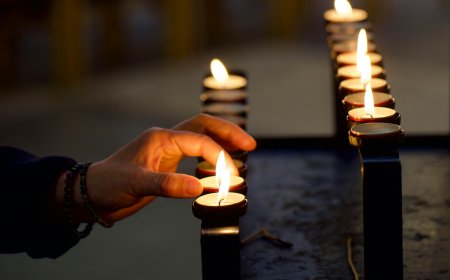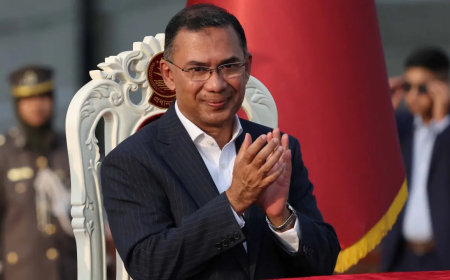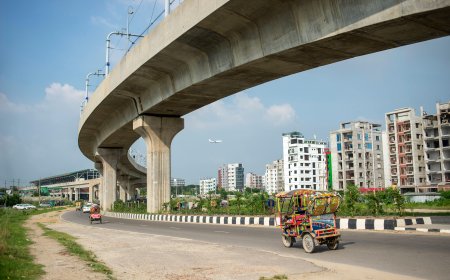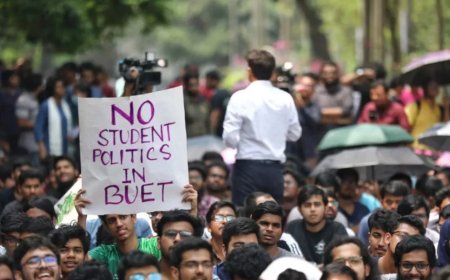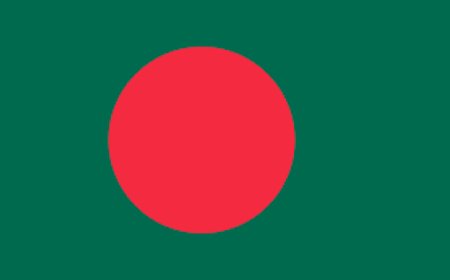Student Politics in Engineering Universities: Can BNP Think Differently?
The time has come to reimagine student politics and free the nation's campuses from violence and criminality. Is the BNP up to the challenge?

In the long history of university-based politics in Bangladesh, "student politics" was never theoretically an unacceptable subject. Rather, from the Language Movement of 1952 to the anti-autocracy struggle -- student society has made important contributions to all these milestones.
Even in 2024, politically conscious students played a key role behind the fall of the fascist Awami League.
So why have engineering and technology campuses in Bangladesh in 2025 started saying "No" to traditional student politics altogether? Particularly in February at Khulna University of Engineering & Technology (KUET) campus where student politics was banned, and last month at Chittagong University of Engineering & Technology (CUET) campus, the Bangladesh Nationalist Student Party (Chhatra Dal) committee announcement faced severe opposition.
The party that suffered the most damage in the movement against the last Awami government should naturally be the preferred organization among youth. But the incidents that occurred at both universities have raised a big question before BNP leadership -- how much need is there really for student politics in engineering and technology universities?
Reality of Student Politics in Merit-Based Campuses
The admission test itself in engineering-technology universities is a tough competition. Students who have studied in science stream and wish to enter these universities have their main goals as education, research, and career. Therefore, their interest in politics or organizational activities is presumably relatively low.
Mainly due to academic curriculum and environment, engineering students have little opportunity to spend time on leisure-based activities, including student politics. From our experiences studying at engineering universities, we have seen very few students who were active in traditional student politics. Among them, very few joined from an actual ideological reason. So, when a student leader moves around campus with a large entourage, exerts influence in the canteen or maintains a culture of eating on credit at shops -- these become negative and hateful subjects in the eyes of ordinary students.
Therefore, "gallery full of followers," "canteen occupation," or "external cadres" -- students see all these forms of old politics as wastage of time and potential. Looking back a bit, we can see that during the Awami League's last 15 years, torture cells, extortion and forceful hall occupation culture spread across almost all campuses - BUET, KUET, CUET, RUET.
There are even examples of administration giving special facilities to Chhatra League leaders and workers. The most horrific incident occurred in 2019. The brutal murder of Abrar Fahad by Chhatra League at BUET campus put a very big psychological pressure on the young student community of this country.
At the same BUET campus during BNP's 2001-2006 period, Sabekunnnahar Soni was killed in crossfire between terrorists of two sides. Although the then government quickly arranged punishment for the guilty under the speedy trial act, a crisis of confidence remained among students due to incidents at other campuses.
This continuity of disappearances-murders-attacks has created political trauma among the student community. According to Ain o Salish Kendra's calculation, an average of 7-10 students have fallen victim to student politics every year since 2000. As a result, whenever any party -- be it Chhatra League or Chhatra Dal -- tries to expand organization on campus, students spontaneously build resistance.
After Abrar's murder, despite Chhatra League having power, they could not strengthen their organizational base at BUET anymore; rather they failed repeatedly against ordinary students' resistance. That is, the politics that could not take root even under the umbrella of power, it is almost impossible for other parties outside power to practice it.
In the conflict at KUET in February, a photo of a Jubo Dal leader with a sharp weapon went viral on social media. Right then the "Chhatra Dal vs ordinary students" conflict took the form of "campus vs outsiders." Where outsiders enter, student society no longer stays in logic-argument -- they consider protecting the campus as the highest moral duty. As a result, the responsibility for conflict sits on the shoulders of political morality. In this reality, BNP has not been able to create sufficient examples to establish the belief that it can provide a different dimension of student politics in merit-based campuses.
In a 2019 survey at BUET, 98 percent of students were against student politics. In a 2023 Center for Governance survey, 43 percent wanted student politics at Dhaka University, while BUET had only 12 percent and KUET-CUET had only 15 percent.
After student politics was banned at BUET, 85 percent of the fighting incidents at KUET, RUET, CUET until 2024 involved outsiders. 70 percent of engineers give more importance to their career than politics (BDJobs and Prothom Alo 2024). Now we compare with foreign countries all the time, but there is no student politics at India's IIT or Singapore's NUS. And their rankings are much better than ours.
An important reality also needs to be considered here—the representation of students from engineering or technology universities in the central leadership of Bangladesh's major student organizations is very low. It is difficult to remember when the central president or general secretary of Chhatra Dal, Chhatra League or Chhatra Shibir last came from BUET/KUET/CUET/RUET. Since BNP's 31-point reform program mentions merit-based appointment, traditional student politics creates no practical necessity for an engineer or science student.
Image Battle on Social Media
Many are saying BNP will win in the upcoming national election. Thinking locally, perhaps candidates and vote symbols are priority issues here, but the big challenge for BNP is not being able to take a strong position against anti-BNP campaigns on social media platforms. A major reason for this is not being able to penetrate the psychology of urban middle-class youth who are relatively more social media users.
This educated youth society often measures Chhatra Dal and Chhatra League on the same scale -- "Everyone is the same, everyone is terrorist" -- such narrative has been established.
In establishing this narrative, on one hand there is the combined role of BNP's opposition like Jamaat-Shibir, NCP, Chhatra League, along with various wrongdoers who commit extortion, murder, occupation using BNP's name. BNP has not yet been able to show the political thinking, planning, and methodology needed to break this anti-BNP narrative.
One of the major reasons for this is the generation gap. Whereas the average age of Chhatra Dal's main leaders is 34 years, ordinary students are 22-23 years old. To get out of this, they need to follow strategies like opening a data-analytics desk to regularly understand the target group's psychology, quick fact-check publication, avoiding reverse blame game. Otherwise, every conflict will be image sabotage -- which will scratch the brand even before power change.
Alternative Leadership Platform
Many Chhatra Dal leaders have argued that if Shibir or NCP conduct secret activities on campus, then why should Chhatra Dal step back? In response, it must be said -- public support is not created through secret activities. Rather people turn away from such politics.
If Chhatra Dal leadership thinks other organizations are secretly working to organize ordinary students in engineering universities, then they should focus on how to do public engagement politics with ordinary students. They need to find ways to build trust and confidence by penetrating the psychology of engineering students who have less interest in politics.
Instead of show-down based student politics, new streams of leadership creation can now emerge through club organizations, social innovation labs, debates and thesis challenges.
There are already some such organizations like BUET Innovation Lab, CUET's Robotics Club, RUET's Entrepreneurship and Career Development Club (ECDC), KUET's Debating Society. Why can’t Chhatra Dal join these platforms?
If BNP's 31-point reform declaration's "merit-based appointment" and "data-driven strategy" take real form, then Chhatra Dal can, if it wants, re-establish itself through student chapters of professional organizations, scholarships, bootcamps and seminars -- without conflict and with public interest-oriented brand equity.
Armed drills, external cadres and campus fights by student organizations of parties wanting to restore democracy do not give the message of healthy reform. Engineering-technology universities have already made it clear that they are in favour of the classroom-lab-startup track, against hooliganism-tender-external politics.
Whether it's BNP-Chhatra Dal or any other organization -- if they truly want to be the charioteer of new-day politics, then their first task must be to end old student politics and create new standards of technology-armed, merit-focused and non-violent leadership.
The day when politics on campus means innovative solutions, startup incubation or policy proposals in science forums; the day when the word "outsider" is banned and only the term "alumni mentor" survives -- that day engineering-technology universities will truly play a role in building a leadership-dependent Bangladesh.
And politics? That too will surely not be a name of fear then, but a grassroots platform for dreaming. The question is whether BNP's student affairs leaders, who have nearly a 3-decade age gap with university students from contemporary events, can read the language of the hearts of young society outside the bubble of their surrounding mature student leadership.
Dr Foysal Kabir Shuvo is a former student leader in BUET and a data professional and urban planner. Subail Bin Alam is a KUET graduate and writes on sustainable development and investment policy. Both are members of Bangladesh Research Analysis and Information Network.
What's Your Reaction?







